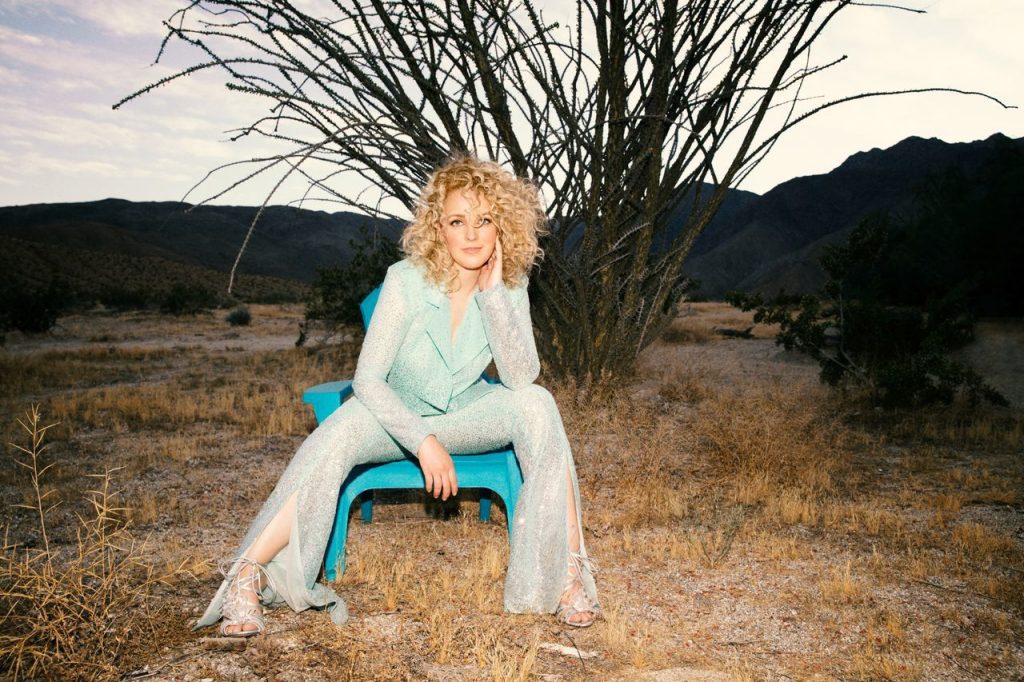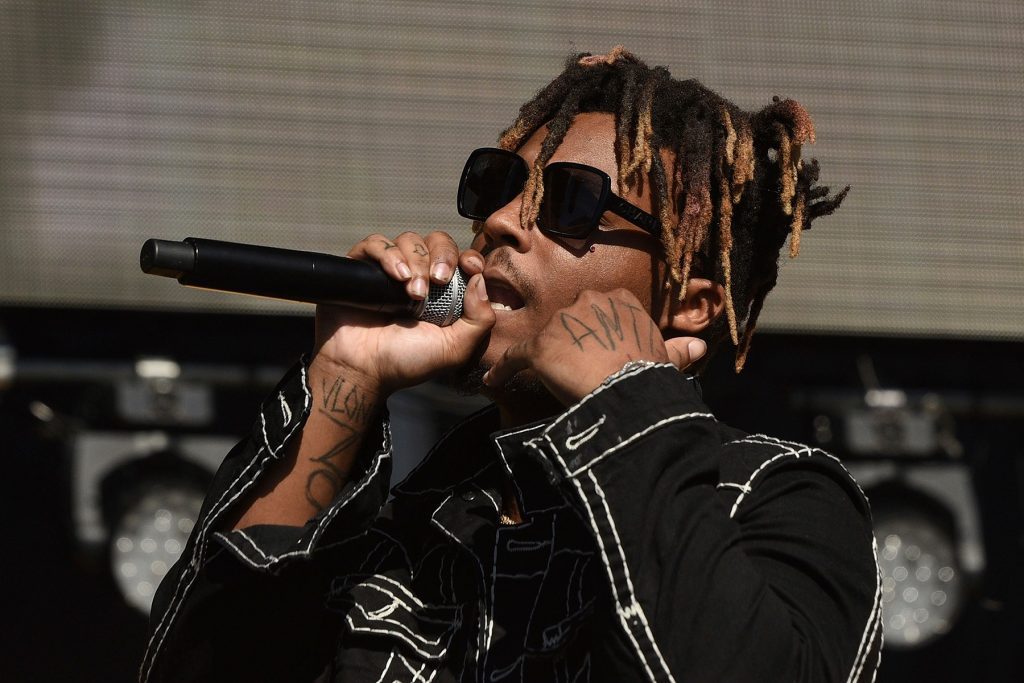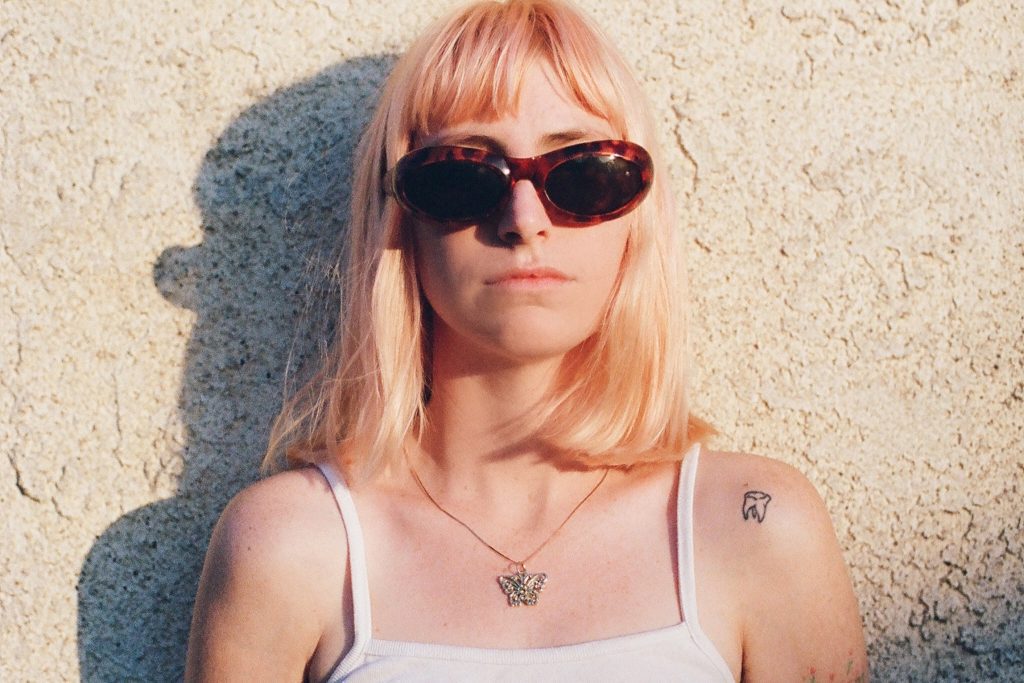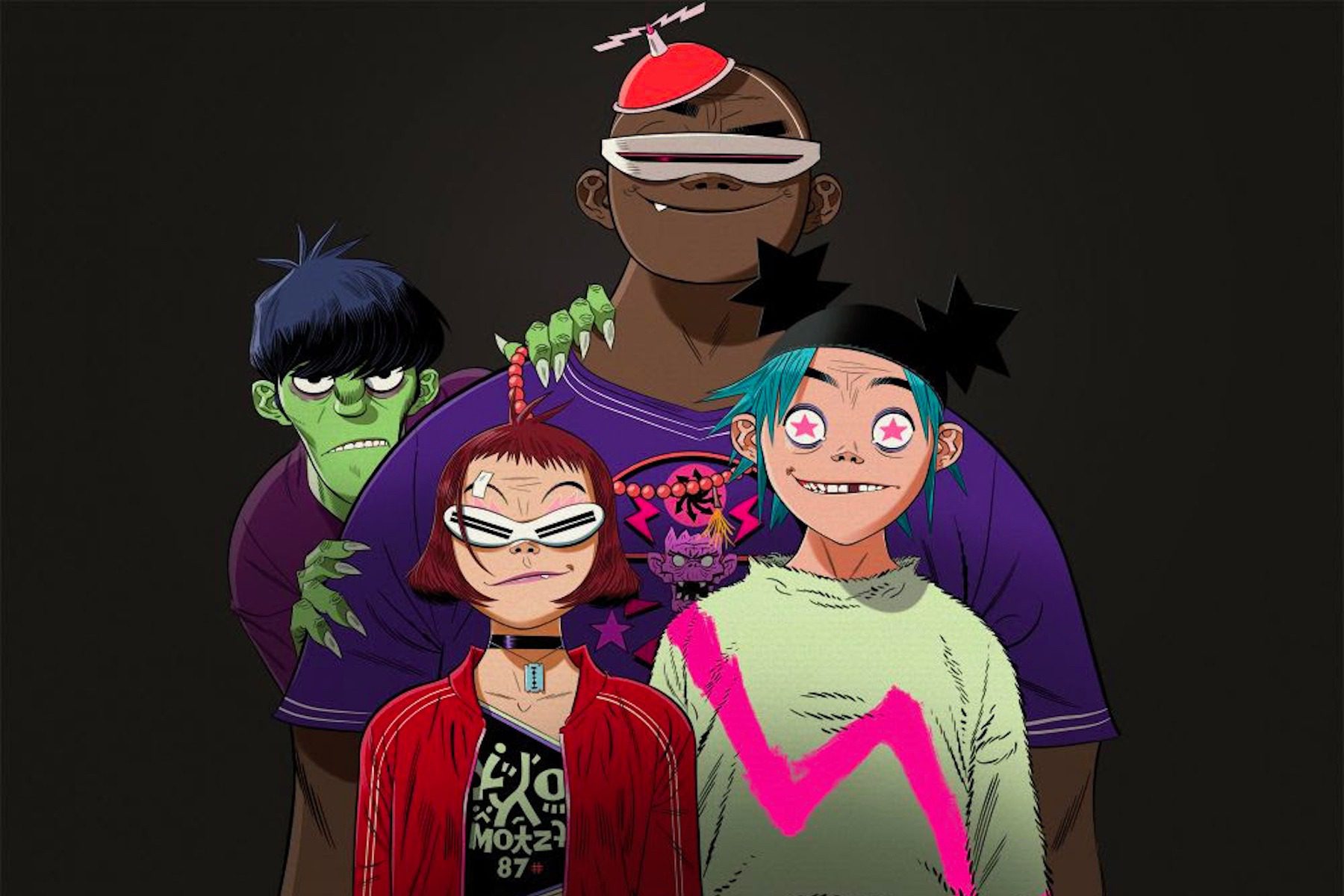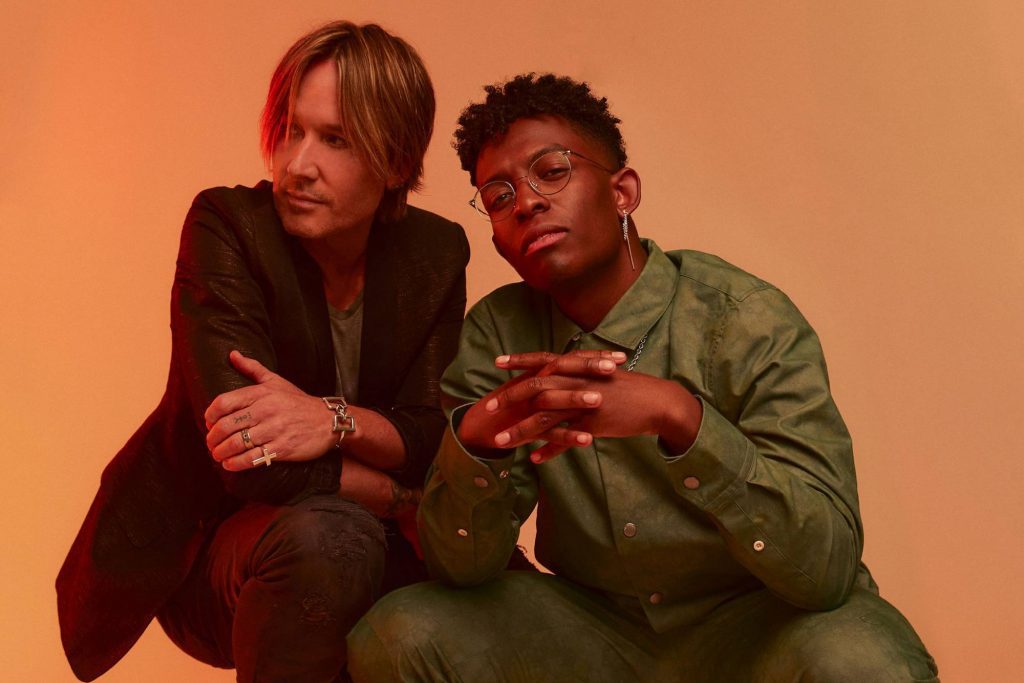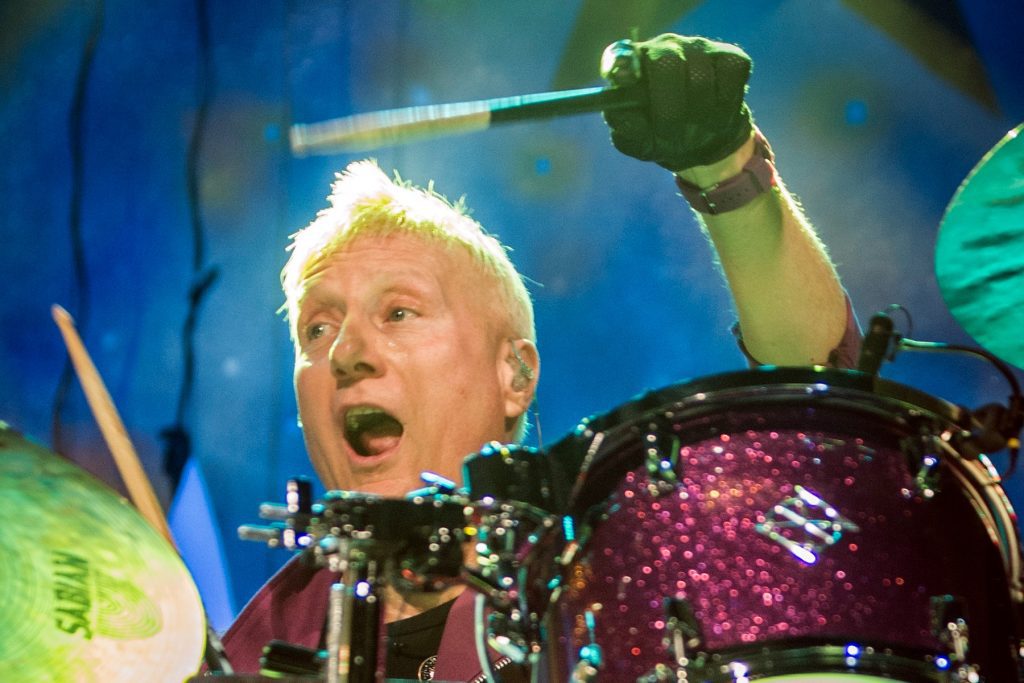
Gregg Bissonette on Dream Gigs With Ringo Starr and David Lee Roth, Avoiding the Spinal Tap Curse
When the Beatles played Detroit’s Olympia Stadium on August 13th, 1966, a seven-year-old aspiring drummer named Gregg Bissonette sat high up in the nosebleeds, rapturously soaking up every second of the experience. “I spent the whole night focused on Ringo,” he says. “He was keeping the whole thing together. It was the defining moment in my life. I remember praying to God, ‘Some day I’d love to play with Ringo.’”
His prayer was answered 37 years later when Ringo invited him to play a few promotional gigs to support his 2003 LP, Ringo Rama. It led to an invitation in 2008 to join his All Starr Band, a position Bissonette has held to this day, even though every other member from his original run is long gone. That means he’s been in a band with Ringo longer than any member of the Beatles, and he’s gotten to back him on Fab Four classics like “I Wanna Be Your Man,” “Yellow Submarine,” and “With a Little Help From My Friends” nearly 400 times each.
That would be a career-defining accomplishment for most drummers, but it’s just a tiny part of Bissonette’s life story. He first made his name as a member of David Lee Roth’s original solo band, and has gone on to play with everyone from Santana and Toto to Don Henley, Spinal Tap, Duran Duran, Ray Charles, Ozzy Osbourne, the Doobie Brothers, and countless others. He’s also worked on the soundtracks to movies like The Devil Wears Prada, Best in Show, American Pie, and Finding Nemo. Amid all that, he also found time to play drums on the musical interludes in every single episode of Friends. (And if you shoot him an email, he’ll gladly play on your song, too.)
We called up Bissonette at his home in Los Angeles to chat about his epic life and career.
How is your quarantine going?
It’s as good as can be. I have a great son and a great daughter, and we’re hanging on here at the house. Thank God, as crazy as things are now, I’ve got this setup in Sherman Oaks, which is about half an hour from where I live, where my drum kit is all mic’d up.
I go into a socially distanced room with my own entrance, I play drums all day on people’s tracks from all over the world that people send me. And then my engineer gets the drum tracks to files and sends them back. It’s a good thing. I’m keeping busy working, so I’m very, very blessed.
I want to go way back here and go through some key moments in your life. How old were you when you first knew you wanted to be a drummer?
I was about six. My dad was a drummer and he always had drums in the basement in Detroit, Michigan, and then later in Warren, Michigan, where we grew up. I’d go down to the basement and play his drums. And my dad had a band that played all around Detroit, and my mom played jazz vibraphone in his band.
That’s how my brother Matt and I got started playing together. It was through my dad’s band. We were just a supermusical family. My sister was involved in music. Both my kids now and my nephews are, too. It’s just a supermusical family, and so I knew I wanted to play more since I’d go down and jam on my dad’s kit. We’d always have little groove sessions by the stereo in the living room. My dad and I would play on album covers with brushes. We’d play along with everything from Buddy Rich to the Beatles.
How did you go from drumming being just a hobby to being your career?
It started with my dad. My parents didn’t go on vacation a lot, but they went on one when I was about 12. He said to me, “Your mom and me are going to Spain with some friends in a couple of weeks. I have a gig, and your Uncle Chuck is going to come over and he’s going to drive you and take the drums to the gig.”
I said, “I’m going to go and play a full gig with your band?” He goes, “Yeah. It’s my band and you know the songs.” I was so excited, but kind of nervous. At a wedding or a party, you’re playing bossa novas, you’re playing swing tunes, or “The Girl From Ipanema” and “Satin Doll.” You’re playing polkas, since there are a lot of Polish and Italians in Detroit.
Whenever my dad wanted to take a break, he let me sit in on drums and play “Joy to the World” by Three Dog Night or Creedence Clearwater’s “Proud Mary,” and he’d go over to the bar and have a beer.
I knew I could cover the rock songs, but the bossa novas and the swings? I was really in my basement practicing like crazy because I learned we were getting $50 a man. At 12 years old I’m going, “I’m going to make 50 bucks! I’m going to sub for my dad!”
And then my brother Matt and I have been playing together since we were 14 and 12. He started sitting in with my dad’s band on bass. Then we started our own band back in Detroit. It was a great group of guys, and we called it Grand Circus Park, named after a park in downtown Detroit. We played Beatles, a lot of Chicago, Zeppelin, Aerosmith. We played all the high school dances. To this day, my brother is my favorite bass payer.
I know your earliest professional gigs were with Gino Vannelli and Maynard Ferguson, but tell me how you wound up in the David Lee Roth Band.
I was doing an audition for Vinnie Vincent of Kiss. He was starting the Vinnie Vincent Invasion. I went down with Myron Grombacher from Pat Benatar’s band. He’s one of my best friends. I went to the audition, but little did I know that Vinnie already had a drummer picked out. It was this guy from Texas named Bobby Rock. But he didn’t want to tell the few drummers that were there, “Hey, don’t bother showing up.”
We played and had a great time. Afterwards he said to me, “I already have a drummer, but I really enjoyed jamming with you. You’d be great for Dave Roth.” I go, “Dave Roth? Isn’t he in Van Halen?” He goes, “Not anymore. He left Van Halen. He got Billy Sheehan from Talas [on bass] and Steve Vai on guitar. They are looking for a drummer. I think you’d be great. Call Steve Vai.”
They were advertising it like the Steve Vai band was looking for a drummer. And so I called Steve and went down and jammed with him and Billy. We had a blast. The next thing was playing for Dave and [producer] Ted Templeman. It all just clicked.
Let’s talk about making Eat ‘Em and Smile. He had made the Crazy From the Heat EP by this point. The record was pretty successful, but it’s pretty weird. There’s a 1920s lounge song and a Beach Boys cover on it. What was the idea going into the album? He was clearly veering away from the Van Halen sound.
The first thing we did when we got the gig was go into Dave’s cool car and we drove to get some Mexican food. He put on a cassette of Frank Sinatra’s “That’s Life” and he said, “You played with Maynard Ferguson’s band. I’m sure you can handle this.” I went, “Wow, Sinatra’s ‘That’s Life’!” It was big band with horns, and he said we were going to record it on the album.
When you say it’s eclectic, yeah. We did Frank Sinatra’s “That’s Life” with a full-on horn section. We did another horn tune called “I’m Easy.” Then songs like “Shyboy” or “Yankee Rose” or “Goin’ Crazy!” are very much in that hard-rock, big-rock sound. And “Big Trouble” and “Bump and Grind.” It was so much fun. We rehearsed a lot for that album and we knew what we were going to do. It wasn’t like, “Hey, let’s go in there and work out a song.” We knew the parts. We had played these songs over and over. We went in the studio and jammed and captured it live.
This is the same exact time that Van Halen is doing 5150. Did you feel like you were in competition with them?
I can only speak for me personally. I was always a huge fan of old Van Halen, songs like “Dance the Night Away” and “Panama” and “Hot for Teacher.” I’m a jazz nut and a rock nut, and when [“Hot for Teacher”] came out, I remember reading an interview in Modern Drummer with Alex saying that he got a lot of that from Billy Cobham. And I was a huge Billy Cobham fan.
I played “Hot for Teacher” all the time. And when I played songs like “The Bottom Line,” that had that same Billy Cobham double-bass shuffle … It wasn’t so much a competition to me as I was a fan of Alex and the whole band. I was like, “This is my chance to do this.” It was exciting more than anything else. It was a crazy time.
Tell me about the tour. There was probably a lot of talk about how much Van Halen to play versus the new solo stuff.
It was a blast putting that together. We’d sit around and be like, “What songs do you want to play?” We started the set off with “Shyboy” and then did our single, “Yankee Rose,” along with “Goin’ Crazy!” We ended with “Jump” and “California Girls.” We did “Just a Gigolo” because [keyboardist] Brett Tuggle had the Emulator sampling synth, so he could sample Edgar Winter’s sax and the horns.
From the early days in Van Halen, we did “Everybody Wants Some!!” and “Unchained,” which is one of my favorites. We did “Panama” and “Ain’t Talkin’ ‘Bout Love,” where Dave would go out to the middle of the arena in a boxing ring and go through the whole audience.
How was the experience of making the second record, Skyscraper, different?
Ted Templeman wasn’t there. Dave and Steve pretty much did that. We did it at Capitol Records down in Hollywood, one of my favorite studios. We had already gone over the songs and rehearsed them, but Brett Tuggle was a new addition. He had the single with “Just Like Paradise.” We all took portable studios on the road. He had that song and “Perfect Timing” and “Stand Up.”
“Just Like Paradise” was the first single off Skyscraper, and it was really cool because it had the “Jump”-y keyboard stuff. It was a little bit of a different way of going about it since we were bringing in songs that now involved Brett. That was one of the coolest things about that band. All through the seven years I was with Dave, we really worked together. We wrote songs together and everyone could bring in stuff. It was a super, super wide range of musicianship and musical taste, from R&B to rock & roll and Latin music, swing.
Why did much of the band leave after the second tour?
I don’t know why they left. Billy was the first to leave and then Steve left after Skyscraper. We then got this guitarist Jason Becker. I don’t know how much you know about the tragedy of Jason, but he is the most unbelievable player. He was the perfect guy to come in after Steve was no longer in the band. He was a San Francisco–based guy. He had this band Cacophony with Marty Friedman from Megadeth. Jason could do these sweeps and all this incredible stuff.
Right after that album, he found out he had ALS. He was only 19. He’s still alive and still going. He’s only able to move his eye, but he still creates music. He has this telephone system like “A, B, C, D, E, F …” and he’ll look at his dad to decipher it. He’s still writing music. It’s amazing. I think of Jason every day.
How was the third tour, in 1991? It was a different musical era and ticket sales weren’t very strong.
Jason couldn’t do the tour, so we had another guy, named Joe Holmes. A great guitar player. He was more like the old Van Halen [self-titled] album. He had that sound. I was helping out finding a guy to go on that tour and he had that feel and that sound. I think that that tour, I’m pretty sure we had Extreme and they were superfun to play before us. That was a great band. All the tours were a blast. My memories are playing things like Monsters of Rock over in Europe, in front of 107,000 people. This kid from Detroit was like, “I cannot believe this.” To this day I’m like, “I cannot believe that I make a living doing what I would do for a hobby anyway. Playing drums is all I have ever done.”
How did you wind up playing with Toto?
I was always a huge, huge fan of Toto. I love the band. I loved Jeff Porcaro’s drumming. He’s one of my drumming heroes. I remember moving to L.A. in 1982. Right when I got there, “Rosanna” comes on the radio. It starts with Jeff playing [imitates sound of the drums]. I’m going, “What is this?” I pulled the car over. I listened to Steve Lukather’s guitar and the keyboards and the vocals. I was like, ”What is this?”
Then I went to see one of my favorite drummers, Vinnie Colaiuta, play at a club. It was that very night, and they were all jamming on “Rosanna.” That album Toto IV just showcased Jeff. Anyway, he passed away at 37. What a tragedy. Simon Phillips, the great drummer from England that had played with Jeff Beck and the Who, he was brought in for something different. A lot of us in L.A., we really worked to play in the style of Jeff, even though nobody could play like him.
Toto asked if I could sub for a four-month tour of Europe. I said, “Absolutely.” I knew a lot of the songs and I learned the new songs. As I say, nobody could play like Jeff, and nobody could play like Simon. But it was a huge honor doing that Tambu tour.
You’ve played on way too many records to go through, but I want to go through a few that caught my eye. Tell me about the Pat Boone metal record.
[Laughs] I got a call from a union contractor. There’s union work and nonunion work. An L.A. Federation of Musicians rep calls me up and goes, “Hey, I got a big band playing heavy-metal hit covers with Pat Boone singing.” I went, “Pat Boone!” He went to North Texas State, where I went, but he was there around 1959 and I was there in 1981. “Pat Boone is going to sing heavy-metal songs?”
I show up and I see a big band. It’s all these first-call players. Pat Boone walks in and he was the coolest. He wasn’t taking this seriously. It was supposed to be fun. It was supposed to be funny. He’s singing “Panama” and a Dio tune. He’s singing “Crazy Train,” “Smoke on the Water,” “Stairway to Heaven.” And he was all about the fun of it. I walked up to him and said, “Pat, I went to North Texas too, but in ’77.” He says, “Let’s go to Denny’s!”
We walk over to Denny’s and this lady says, “You’re Pat Boone!” He goes, “That’s right. And I’ll have a milkshake and a BLT.” I’m going, “Wow! Pat Boone!” I listen to that album all the time because it was really well-recorded. Jeff Weber, the producer, did a great job of putting that together.
How did you wind up playing with Ray Charles on the Genius Loves Company sessions?
We did one song at the Record Plant. The band was all there and we went through the song once. It was a shuffle version of “You Are My Sunshine.” I was thinking, “Ray Charles!” He sat at the piano, we played it, and then he got up and he split. I remember the producer going, “OK, Ray. That was really great, man. We’re going to do another take.” And he goes, “I’m done.” He was done! It was one take, the old-school way. Ray probably got his money and split. I don’t know what happened to the song, but Jimmy Johnson, one of my favorite bass players, played bass. It was a great session. Ray was grooving.
How about the Robert Downey Jr. record in 2004?
That was a fun album. Mark Hudson, one of my dear friends, called and said, “Robert Downey Jr. and I have all these songs and want to go in the studio and record.” I thought, “Wow, Robert Downey Jr.” I didn’t know Robert Downey Jr. sang and played like that. But when he sat down at the piano, he could play and sing! I remember one time he came into the control room and was like, “I want sort of a clock sound.” I started clicking on my drums and we just hit it off musically. He is a supertalented guy.
Tell me how you became Spinal Tap’s drummer.
My good friend C.J. Vanston has been the musical director for Spinal Tap for many, many years. Their first drummer, Ric Parnell, I don’t know what happened, but they needed me to sub years ago. My first show was a NAMM show in California. I learned the set and just had a blast. I was a huge fan. My brother took me to see the movie when it came out. At first I didn’t get it, but then I was like, “I get it!” To be a fan of Spinal Tap and to be the drummer … I remember them saying, “What’s a good fictional British name for you?” I said, “Skippy Skuffelton.”
C.J. then booked tours. We played Live Earth on this huge bill in front of 80,000 people at Wembley Stadium. Eighteen bass players came out and played on “Big Bottom.” We did several tours and an album called Back From the Dead, where we redid all the original Spinal Tap stuff. Because of C.J., I’ve gotten to work on all the Christopher Guest movies, like Best in Show, Waiting for Guffman, A Mighty Wind, and For Your Consideration. I’ve done two Harry Shearer albums. They are the coolest guys, the smartest guys, and the funniest guys. What a blast.
I’m sure you’ve heard all the jokes that their drummers usually die. I guess you beat the curse.
Man! I remember playing the Greek Theatre, and my dad, Bud, was my drum tech. He set my drums up and went over to Derek Smalls [Harry Shearer], and he went, “Derek, I’m a little worried about my son. All your other drummers have died mysteriously.” Derek looked around. He looked at every corner of the stage and the audience, and he said, “Bud, we’ve got the place secured. He’s going to be OK [laughs].”
Let’s move into soundtracks here. Tell me about your work on Friends.
My brother and I played bass and drums on all 10 years of Friends. It started when I was subbing for a great friend of mine, Doane Perry, on a Broadway album. The keyboard player was Michael Skloff and we really hit it off. We played really well and jammed really well. He goes, “Hey, my wife is creating a show. If it happens, I want you to play drums.” Six months or a year later or something, I heard, “She’s got the show. Come on down and bring your brother.”
That was Friends. His wife was Marta Kauffman. That was 10 years. What a blast. We had a great guitar player. Michael would play keyboards. We didn’t do the theme song though. That was the Rembrandts. But we were on all 10 seasons. Say they’re on a couch and then they go to the bowling alley … [imitates drum sound]. If we liked a take, we’d all put our hands in the air like it was a touchdown. “Good take! Next one!”
That show is still making hundreds of millions. Do you get any royalties for all that work?
Yeah. One of the great things about the Musician’s Union is they have two different checks that go out throughout the year. One is for all of the albums that you’ve played on. It’s called the Phonograph Special Payments Fund. The other is called the Motion Picture and TV Special Payments Fund. Friends is in syndication, so that’s always a huge part of my check. The union is on that.
Tell me how you first started working for Ringo.
In 2003, a great longtime friend and fantastic engineer pal of mine, Bruce Sugar, recommended me for a recording session that Mark Hudson was producing for Steven Tyler. Mark had just finished producing a great new Ringo album called Ringo Rama.
Instead of getting the normal drum sounds by hitting the kick drum for a long time, then snare, then toms, etc., I decided to get sounds with Bruce by playing every groundbreaking and game-changing classic Ringo groove I could think of: “Come Together,” “Ticket to Ride,” “Tomorrow Never Knows,” “In My Life,” “Get Back,” “Back Off Boogaloo,” “The End” drum solo …
Mark came into the drum room and said something like, “Man, I have heard for years that Ringo is your hero, but now I really get to see for myself!” He recommended me for the upcoming Ringo and the Roundheads promo tour, and he also recommended my brother Matt to be the bassist.
How did you go from that little promo tour to the All Starr Band?
Around 2005 or 2006, Ringo said, “I love jamming with you. I’d love to have you in the All Starr Band, but you’d have to have a couple of hits that you sang.” I said, “Well, that’ll never happen.” Then in 2008, his manager Bruce [Grakal] called me. I was just praying, “Please, God, help me play more with Ringo.” The next day Bruce calls and is like, “Hey, Ringo has run out of drummers that have hits. He wants you to be in the All Starr Band on this tour.”
I freaked out. That was in 2008. By the grace of God, I’ve been in his All Starr Band for 12 years. We were supposed to be on tour now, but we moved our tour to 2021. What an honor.
Before you, it was Sheila E. and Simon Kirke, drummers with hits.
Exactly. To me, the big thing is that I just look to my right and five or six feet away, there’s the guy that made me want to play in a band. I look at his snare drum and just stare at it when it hits that backbeat. I just want to be in that Ringo pocket. Ringo has this feel that nobody else has. First of all, he’s left-handed and playing on a right-handed kit. He’s got this swing. One of his favorite drummers was Cozy Cole, who had that song “Topsy.” That’s how Ringo plays, and I always want to just meld into his pocket. The way he feels the songs and the way his swing is, nobody can play like him. It’s just the greatest thrill to be next to a hero like that and to play with him.
We’ve become the best of friends. He just celebrated turning 80 years young. He’s the fittest guy. He’s a role model, not just in playing drums, but he’s so healthy. He’s a vegetarian. He has a great exercise regime. He’s about peace and love. He really means it. He’s full of peace and he shows love to his friends and family and band. He’s all about love.
At All Starr Band shows, he spends some of the night singing in front of the stage and you’re the sole drummer. At other points, you’re playing side-by-side on two drum kits. How do you play in a way that complements what he’s doing without ever stepping on his toes?
The songs that he’s up front: “Matchbox,” “It Don’t Come Easy,” “Photograph,” “Yellow Submarine,” “I Am the Greatest.” When he comes back and does the songs on the drums, I want to complement and meld in and groove. I’m really aware of what he’s doing at all times. If I see he’s going for a fill, I’ll just keep the groove going and not play a fill. Sometimes I’ll just raise an eyebrow and it’s like, “You take this one.”
We often play the same parts. If we’re learning the parts for a new member in the All Starr Band, we’ll rehearse it and talk about it, and play pretty much the same parts. But one song he might play high-hat for a while and I’ll play the main thing, or vice versa.
Tell me about first rehearsing with a new All Starr. What does it take to get their songs in and weave them into the fabric of the band for everything else? Gregg Rolie told me he was nervous at first when he came in.
The great thing that I have gleaned in my 12 years in being in the All Starr Band is that whenever a new member comes in and they have their two or three hit songs, Ringo wants them to be the musical director of their songs. He’s like, “How should it end since it fades out on the record? How should we do the harmonies?” Take Gregg Rolie on “Black Magic Woman,” “Evil Ways,” and “Oye Como Va.” Gregg is very good about giving everyone musical freedom, but he gets to be the musical director.
It must be a fun challenge for you as well, since you get to play so many different kinds of music in one night, from Men at Work to Santana to Toto.
That’s the thing. Like Ringo says, it’s the greatest 1-800 band. In the 12 years I’ve been in the band, there have been so many different stylistic grooves — from things that are sort of shuffles to things that are more rocking to lighter songs, where we play with brushes or a shaker.
Anyone that comes to an All Starr Band show is hearing seven different bands in one night. And there’s no fluff material. These are all hits. These are all fantastic musicians, great singers, great songwriters. You hit it on the head. It’s so stylistically diverse. I’ve never thought about being the best drummer of anything, but I like being good at almost everything. That’s how to make a living as a drummer.
I was at Radio City Music Hall in 2010 when Paul McCartney came out and did “Birthday.” I’ve seen Ringo say that he didn’t know that Paul was going to do that. You kept it a surprise?
We did. We did a secret soundcheck with Paul. We usually soundcheck at four o’clock, five o’clock, or six o’clock. We did a secret one around two o’clock. Paul came over and he had his Hofner bass. I remember one lady at the front came and asked for an autograph. He said, “I’ll sign it, but don’t say a word to Ritchie.”
[Ringo] walked out and the place just erupted. He points to me, we start it, and I look over at the side of the stage because [his wife] Barbara and her sister Marjorie and Joe Walsh, they put it together. Ringo was going, “Alright, OK, we’re done …” He’d just done “With a Little Help From My Friends” and Yoko came out with cake. Then Barbara was saying, “Wait a second, Ritchie …”
He sees Paul come out and he hears us do “Birthday” and he runs over to the riser and jumps up and grabs his sticks from [his drum tech] Jeff Jonas. We start playing. The funny thing is he was so happy, but then he turns to me and is like, “How does this beat go? I haven’t played this since 1968!” I showed it to him.
Then there’s an eight-bar drum break. He’s looking at me like, “You take it!” I’m like, “Come on! Let’s do it together!” We played it. You can just tell. He had a ball.
For you, this is being part of the closest thing possible to a Beatles reunion. I can’t imagine a greater thrill.
I’m looking to my right and there’s Ringo. As I’ve said a million times, he’s the guy that made me want to be in a band. Then I’m looking straight ahead and Paul McCartney is looking at me and smiling and grooving. The three of us were the rhythm section for a minute. I kept flashing back on Olympia Hockey Arena and seeing that when I was seven.
Who would have thought I’d get to play with Ringo and Paul? That was his 70th and he was healthy and rocking then. He’s even more healthy and more rocking 10 years later at 80 years young. He’s unreal.
Do you see Ringo still doing this at age 90?
I do. He always says that he’s 24 in his brain because he’s so youthful. I don’t know anybody that is in the shape he’s in. I will go a little later to the gym some mornings and he’s still in there running on a treadmill, not walking, running. We’ll be on a plane. We call it Air Ringo. I kind of coined that phrase. Now we have these Air Ringo duffle bags.
Anyway, we’re on Air Ringo and there’s every kind of food you could ever imagine. It’s rocking. “Would you like the Pellegrino and the shrimp?” They just have everything from pizza to fried chicken. But Ringo is in the front and just kind of looking at everybody, eating so healthily. He has broccoli during the day and a baked potato. He’ll do a cashew bar or something that’s really healthy.
I see everyone hungry after the gig, just going for it. Then they’re going to go to sleep and just sleep on everything they ate. He has it down. He’s so healthy. He’s playing better than ever. He looks better than ever. He’s so happy. I see no end in sight for Ringo.
Who haven’t you played with at this point that you’d love to play with?
I love so many styles of music. I think maybe in the jazz realm, Chick Corea has always been one of my favorite jazz guys. I love Chick and all of his drummers.
There’s just so many artists. Stevie Wonder. He’s probably my favorite male vocalist of all time. I did an audition with him years ago. It was a blast. We had half an hour of just the two of us in a room. He ended up keeping his regular drummer anyway, but there is someone I’d love to play with.
Earth, Wind, and Fire. I was also always a huge Chicago fan. Danny Seraphine, their original drummer, another game changer. The game changers are Gene Krupa, Buddy Rich, Ringo, John Bonham, Stewart Copeland, Tony Williams, Elvin Jones, Steve Gadd. There’s drummers and then there are game changers. Danny Seraphine is one of those game changers. I’d love to do a gig with that band, playing those hits sometime.
I hope those Ringo 2020 dates wind up happening next year.
We have the dates booked. The tickets are selling. Of course, the ones booked for this year have been postponed, not canceled. We’re going to do a tour in May-June and then another in September-October. Hopefully right now everything has just been postponed until next year. I sure hope we get out there. I’ve had such a blast my whole life playing so many cool gigs, but nothing can compare to the All Starr Band with Ringo. It’s just unbelievable.
